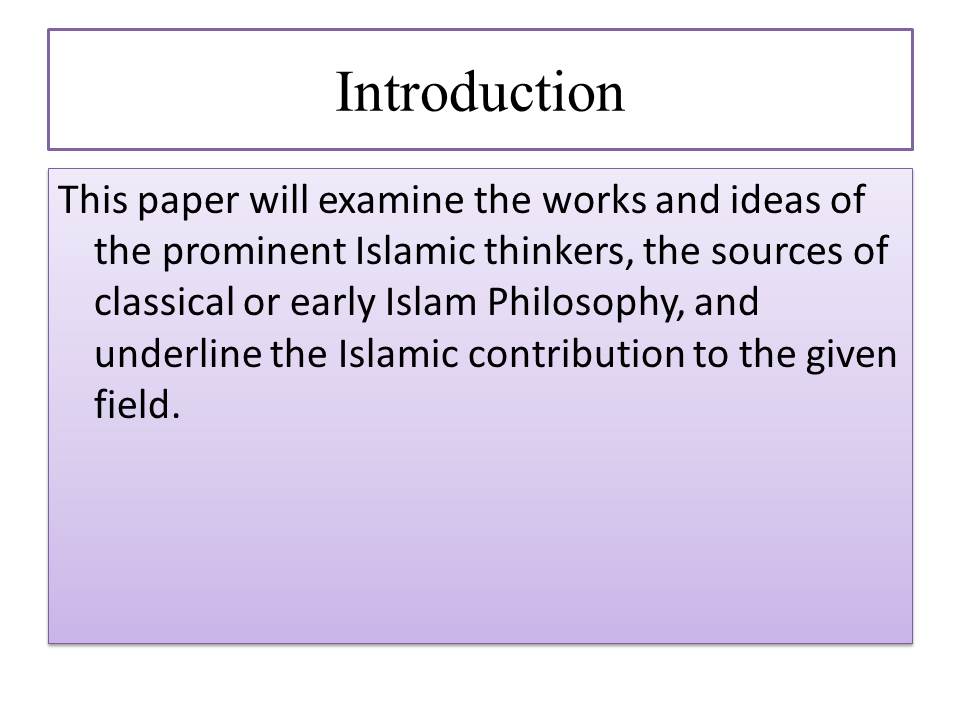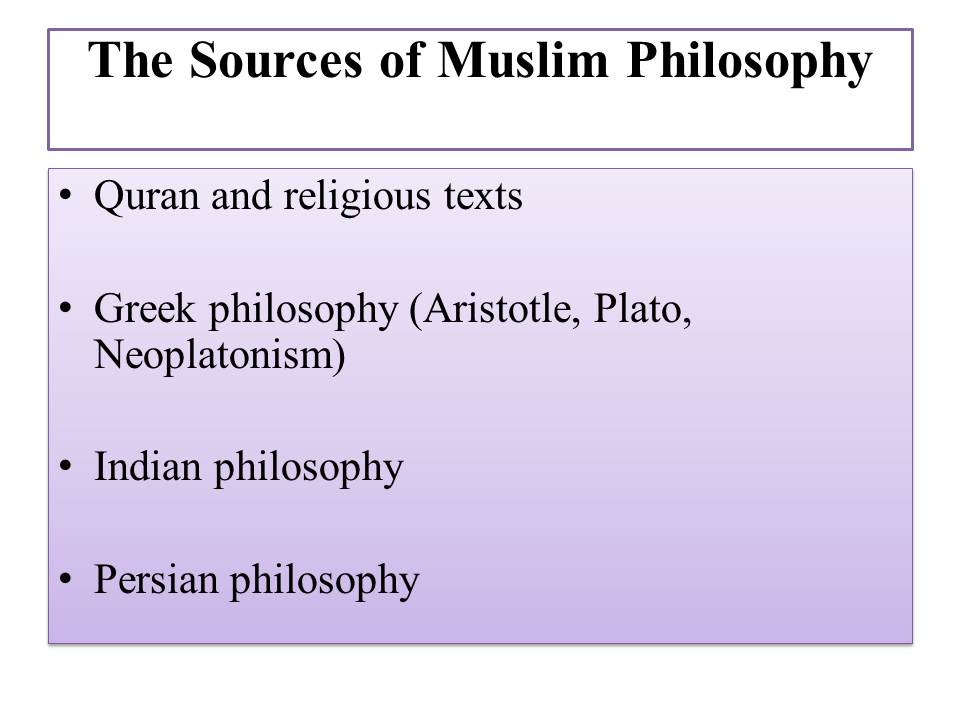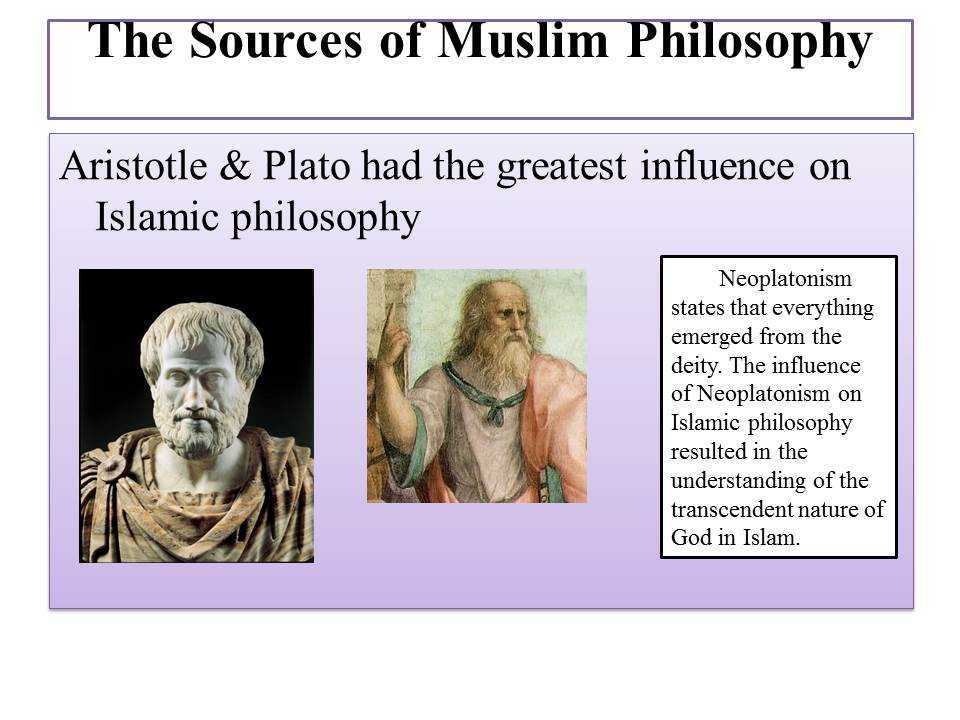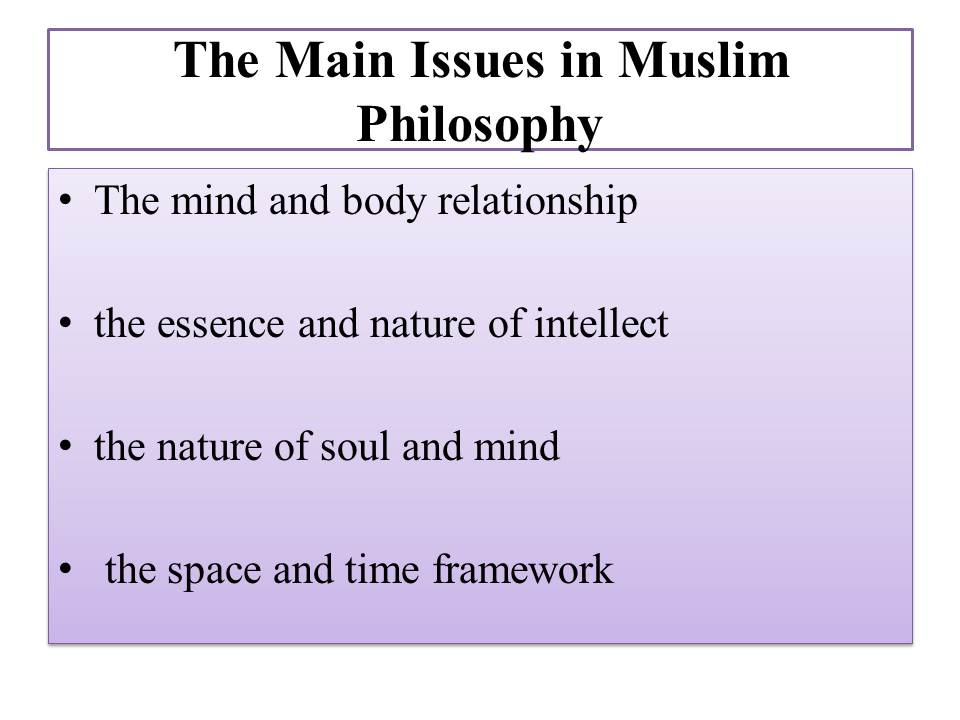Introduction
This paper will examine the works and ideas of the prominent Islamic thinkers, the sources of classical or early Islam Philosophy, and underline the Islamic contribution to the given field.
To start with, the contribution made by the prominent Muslim philosophers, including Averroes, Avicenna, Abū Bakr al-Rāzī, and l-Fārābī, is quite considerable. The Muslim thinkers raised such philosophical problems as the mind-body question, the nature of the soul, the relationships between God and a Human, and the framework of space and time.

The Sources of Muslim Philosophy
- Quran and religious texts;
- Greek philosophy (Aristotle, Plato, Neoplatonism);
- Indian philosophy;
- Persian philosophy.
The primary sources of Muslim philosophy are the Quran and religious texts, Greek philosophy (Aristotle, Plato, Neoplatonism), Indian philosophy, Persian philosophy.
Aristotle & Plato had the greatest influence on Islamic philosophy.
The essential source of classical Islamic philosophy was Greek philosophy, including the teachings of such Greek thinkers as Aristotle and Plato. The influence of Neoplatonism on Islamic philosophy resulted in the understanding of the transcendent nature of God in Islam. This Greek philosophical teaching states that everything takes its origin from the deity. As a matter of fact, the influence of Neoplatonism on Islamic philosophy was enormous and it finally resulted in a more profound and detailed understanding of the transcendent nature of God in Islam.


The Main Issues in Muslim Philosophy
- The mind and body relationship;
- the essence and nature of intellect;
- the nature of soul and mind;
- the space and time framework.
Classical Islamic philosophy touches a great number of uncertain and challenging philosophical problems. Here are just few of them: the mind and body relationship, the essence and nature of intellect, the nature of the soul and mind, and so forth.
Muslim thinkers were trying to understand Quran in a more detailed and profound manner.
However, one of the most important and thought-provoking philosophical issues was the interpretation of the Quran and other religious texts. Muslim thinkers have always tried to understand the Quran in a more detailed and profound manner to define the desired nature of relationships with God and attitudes to all living creatures.


The Greatest Muslim Thinkers
Avicenna
“Flying Man” experiment – a person will exist even without exposure to any sensations.
Avicenna or Ibn Sînâ mostly touched on the mind-body problems that was thought-provoking for philosophers of all times. Ibn Sînâ can be considered the most influential philosopher in the Islamic tradition. Furthermore, he shares the title of one of two most famous “dualists”, together with a French thinker, René Descartes. In addition to that, Avicenna was known as a follower of Aristotle, which influenced his flow of thoughts to the greatest extent. Avicenna largely touched on the mind-body problem.
Averroes
Averroes is primary famous for the translations and commentaries on Aristotle’s teachings. Averroes’ leading idea was that religion does not refute philosophy; these two disciplines can be considered highly compatible. Averroes pointed out that the Quran does not provide accurate data and reasonable explanations of natural and social phenomenon. Its sayings are especially unclear if the followers would try to read this Sacred Book in a literal way. Therefore, Averroes accentuates that the Quran should be taken as a “poetic approximation of the truth” (The Philosophy Book: Big Ideas Simply Explained, 2017).
Shahab al-Din Suhrawardi
Light operates at all levels of the reality.
Illuminationist, Illumination, or Ishraqi philosophy, was introduced by Shahab al-Din Suhrawardi. This thinker was influenced by his predecessor Avicenna and the teachings of Neoplatonism. The philosophy of illumination is inflenced by the idea that “light operates and at all levels” As a matter of fact, the tradition of Islamic philosophy is still alive mostly due to the teachings of the given philosophy.



Conclusion
- The Sources of Muslim Philosophy: Greek philosophy (Aristotle, Plato, Neoplatonism), Indian philosophy, Persian philosophy;
- The Problems: the mind-body relation, the nature of the human soul, the relationships between God and Humans;
- The Thinkers: Avicenna, Averroes, Shahab al-Din Suhrawa.
Islamic philosophy is profound in regards to its main ideas and Muslim philosophers. The essential sources of the Muslim philosophy are the Quran (and religious texts in general), Greek and Indian philosophies. It is impossible to speak of Islamic philosophy and not to mention such names of Avicenna, Averroes, and Shahab al-Din Suhrawardi among other greatest thinkers. It also should be noted that the most discussed problems raised by Muslim philosophers are the mind-body relation, the nature of the human soul, the relationships between God and Humans.
References
Adamec, L. (2016). Historical dictionary of Islam. Rowman & Littlefield.
Kadhim A.S., Shukri B., Owoyemi,Y., & Ahmad, M. (2017). Islamic ethics: the attributes of Al-Ihsan in the Quran and its effects on Muslims. International Journal of Business and Social Science, 8 (11), pp.102-107.
Nasr, S., Dagli, C., Dakake, M., Lumbard.J., & Rustom M. (2015). The study Quran: A new translation and Commentary. New York.
The philosophy book: big ideas simply explained. (2017). DK Publishing.